Top 7 Health Benefits of Hummus
A very well-liked Middle Eastern spread and dip is hummus. In order to make it, you usually use a food processor to combine chickpeas (garbanzo beans), tahini ... read more...(ground sesame seeds), olive oil, lemon juice, and garlic. Hummus is not only scrumptious, but it is also adaptable, nutrient-rich, and associated with a number of remarkable health and nutritional advantages. Here are the best hummus advantages supported by science.
-
Hummus is a healthy food choice since it is packed with vitamins and minerals. A 100-gram (3.5-ounce) portion of hummus has these benefits:
- Calories: 166
- Fat: 9.6 grams
- Protein: 7.9 grams
- Carbs: 14.3 grams
- Fiber: 6.0 grams
- Manganese: 39% of the RDI
- Copper: 26% of the RDI
- Folate: 21% of the RDI
- Magnesium: 18% of the RDI
- Phosphorus: 18% of the RDI
- Iron: 14% of the RDI
- Zinc: 12% of the RDI
- Thiamin: 12% of the RDI
- Vitamin B6: 10% of the RDI
- Potassium: 7% of the RDI
With 7.9 grams of plant-based protein per serving, hummus is a fantastic source of this protein. Because of this, it's a fantastic choice for those who follow a vegetarian or vegan diet. For the best possible immune system, development, and recuperation, one must consume adequate protein. Hummus also contains B vitamins, iron, folate, phosphorus, and other nutrients that vegetarians and vegans may not receive enough of from their diets.
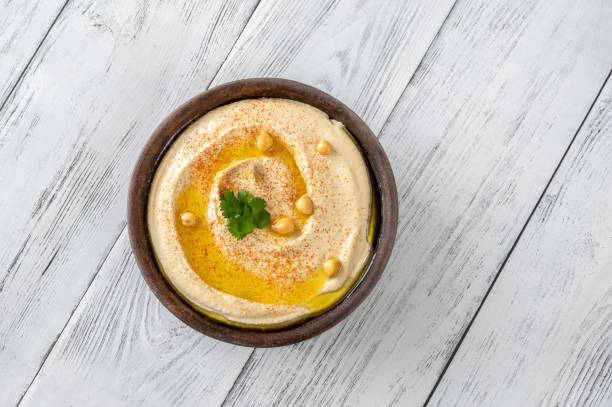
Super Nutritious and Packed With Plant-Based Protein 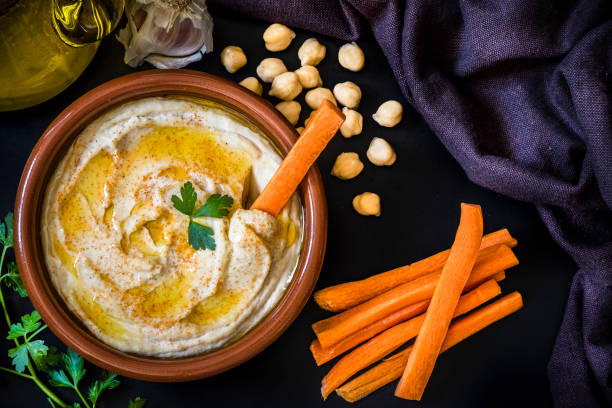
Super Nutritious and Packed With Plant-Based Protein -
The body uses inflammation as a kind of defense against damage, disease, and infection. Inflammation can, however, occasionally last longer than is required. Chronic inflammation is what this is, and it's been connected to a lot of really significant health issues. Healthy components included in hummus may aid to reduce chronic inflammation. One of them is olive oil. Strong antioxidants found in it have anti-inflammatory properties.
Olive oil, in particular virgin olive oil, includes an antioxidant called oleocanthal, which is thought to have anti-inflammatory qualities comparable to those of over-the-counter anti-inflammatory drugs. Tahini, which is made from sesame seeds, may also aid in lowering IL-6 and CRP levels, which are increased in inflammatory conditions like arthritis. Additionally, several studies have demonstrated that eating a diet high in legumes, such as chickpeas, lowers blood indicators of inflammation.

Rich in Ingredients Proven to Help Fight Inflammation 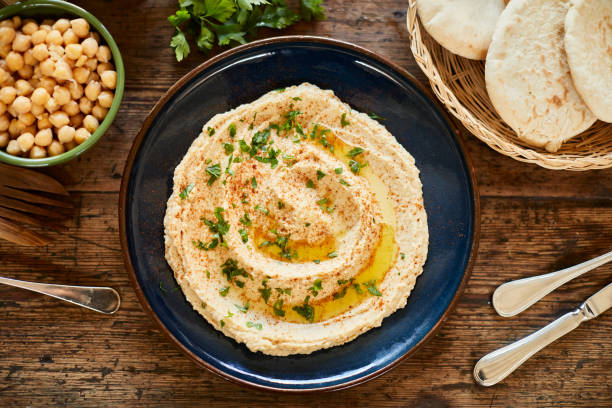
Rich in Ingredients Proven to Help Fight Inflammation -
Dietary fiber, which is abundant in hummus and can enhance digestive health. Per 3.5 ounces (100 grams), it offers 6 grams of dietary fiber, which is comparable to 24% of the daily fiber requirement for women and 16% for men. Hummus' high fiber content can aid in maintaining regularity. This is because dietary fiber makes feces softer and more substantial, making them simpler to pass. Additionally, dietary fiber supports the growth of good bacteria in your gut.
According to one study, consuming 200 grams of chickpeas (or chickpea raffinose fiber) daily for three weeks encouraged the growth of good bacteria like bifidobacteria while inhibiting the formation of dangerous bacteria. Gut bacteria may transform some of the fiber in hummus into short-chain fatty acid butyrate. This fatty acid offers a number of remarkable advantages and aids in nourishing colonic cells. According to laboratory research, butyrate synthesis is associated with a reduced risk of colon cancer and other illnesses.

High in Fiber That Promotes Digestive Health and Feeds Your Good Gut Bacteria 
High in Fiber That Promotes Digestive Health and Feeds Your Good Gut Bacteria -
There are a number of qualities in hummus that might aid with blood sugar regulation. First off, chickpeas, which have a low glycemic index, are mostly used to make hummus (GI). The glycemic index is a measurement that assesses how quickly food might increase blood sugar levels. High GI foods are quickly broken down and absorbed, which causes a dramatic rise and decrease in blood sugar levels. In contrast, meals with a low GI rating take longer to digest and absorb, which results in a more gradual increase and decrease in blood sugar levels. In addition, hummus is a fantastic source of soluble fiber and good fats.
Protein, resistant starch, and antinutrients, which slow down the digestion of carbohydrates, are all abundant in chickpeas. Additionally, fats help slow down the gut's absorption of carbohydrates, which results in a slower and more consistent release of sugar into the bloodstream. For instance, although having the same amount of carbohydrates as hummus, research has shown that white bread causes the release of four times more sugar into the blood after a meal.

May Help Control Blood Sugar Levels 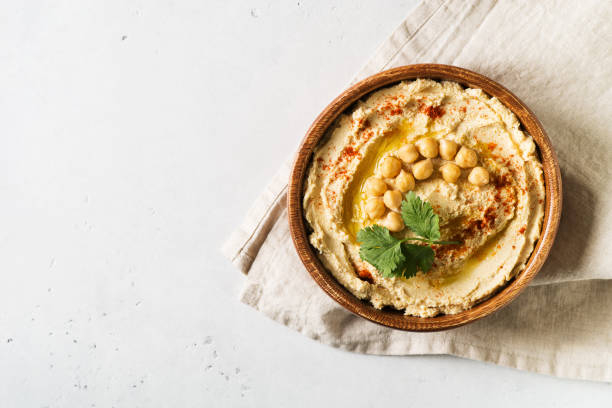
May Help Control Blood Sugar Levels -
In the entire world, heart disease is the fourth leading cause of mortality. Several components in hummus have the potential to lower risk factors for heart disease. 47 healthy people participated in a five-week trial where they either consumed a diet with added chickpeas or a diet with extra wheat. Following the trial, participants who ate more chickpeas than wheat had "bad" LDL cholesterol readings that were 4.6% lower. A diet high in legumes like chickpeas was also shown to lower "bad" LDL cholesterol by an average of 5%, according to a study of 10 research including more than 268 participants. Hummus is a fantastic source of heart-healthy lipids from olive oil in addition to chickpeas.
According to a review of 32 research involving more than 840,000 participants, persons who consume the most healthy oils, particularly olive oil, had a 12% reduced chance of dying from heart disease and an 11% lower risk of dying overall. Another study discovered that the risk of heart disease was lowered by an additional 10% for every 10 grams (or roughly 2 tsp) of extra virgin olive oil ingested each day. Although these findings are encouraging, further extensive research on hummus is required.

May Reduce Heart Disease Risk 
May Reduce Heart Disease Risk -
Numerous research has looked at the effects of hummus on weight reduction and maintenance. It's interesting to note that a nationwide survey found that those who regularly ate hummus or chickpeas were 53% less likely to be fat. The average waist circumference of those who frequently ate chickpeas or hummus was 2.2 inches (5.5 cm) less than that of those who did not. They also had lower BMIs. However, it's not fully obvious whether these outcomes were caused by particular qualities of chickpeas or hummus or just by the fact that people who consume these meals have generally healthy lives. Larger consumption of legumes like chickpeas has also been associated with decreased body weight and increased satiety in other research.
There are a number of qualities in hummus that might support weight loss. It is an excellent source of dietary fiber, which has been proven to increase levels of the hormones cholecystokinin (CCK), peptide YY, and GLP-1, which are associated with feeling full. Additionally, dietary fiber has been demonstrated to lower ghrelin levels, which is a hunger hormone. Fiber may aid in lowering calorie intake, which encourages weight reduction, by suppressing hunger. Hummus is also a fantastic source of plant-based protein. A higher protein diet has been found to help reduce hunger and increase metabolism.
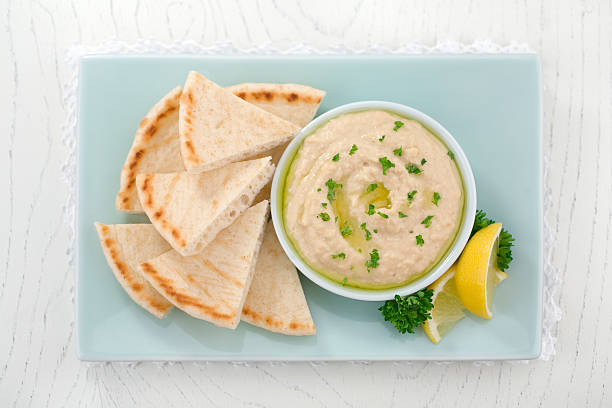
Maintain a Healthy Body Weight 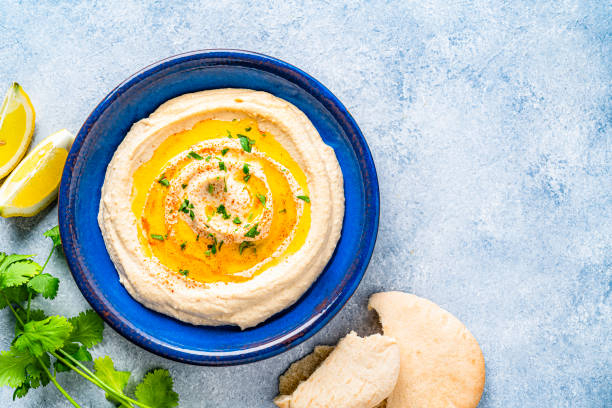
Maintain a Healthy Body Weight -
Millions of individuals throughout the world are affected by food allergies and intolerances. It can be difficult for people with food allergies and intolerances to consume something that won't make their symptoms worse. Fortunately, almost everyone can love hummus. It is suitable for those who suffer from common diseases including celiac disease, nut allergies, and lactose intolerance because it is naturally devoid of gluten, nuts, and dairy.
Hummus naturally lacks these elements, but it's still a good idea to study the whole ingredient list because some brands may also have preservatives or other additives. Additionally, take notice that raffinose, a form of FODMAP, is abundant in chickpeas. Hummus should only be consumed in moderation by people who are sensitive to FODMAPs, such as those with irritable bowel syndrome. Also bear in mind that hummus contains tahini, a paste made from sesame seeds. In the Middle East, sesame seeds are a frequent allergy.
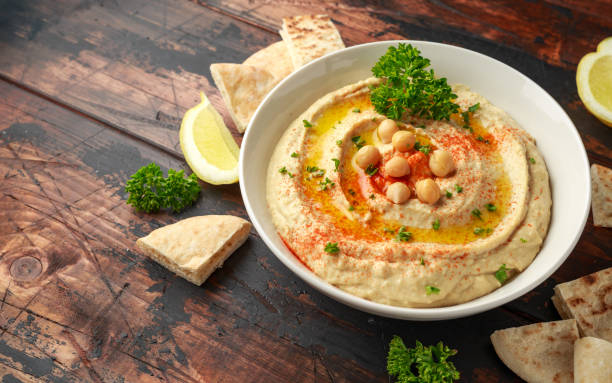
Great for Those With Intolerances 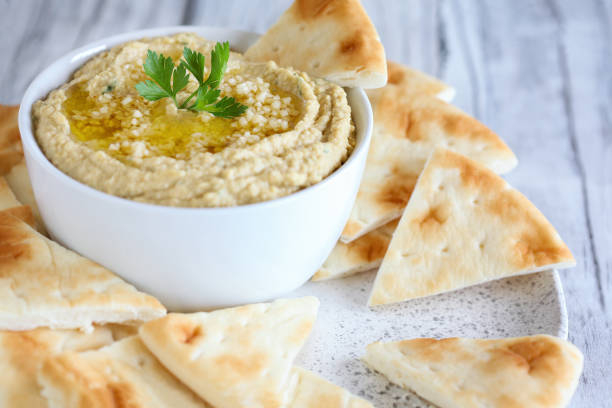
Great for Those With Intolerances




























